PS320 History and Systems of Psychology: Ockham to Romantic Revolt
VerifiedAdded on 2023/04/23
|11
|3005
|266
Essay
AI Summary
This assignment comprises two essays exploring key figures and movements in the history of psychology. The first essay discusses William of Ockham's contributions to moral psychology, Thomas Hobbes' laws of social life, and the influence of the Romantic revolt on emphasizing human emotions over rationality. The second essay compares and contrasts Charles Darwin and Herbert Spencer's perspectives on evolution, outlines Noam Chomsky's influence on behaviorism and psycholinguistics (particularly his concept of innate language acquisition), and describes Lightner Witmer's contribution to the field of clinical psychology, focusing on his establishment of clinical psychology as a distinct discipline and his goals for its development.
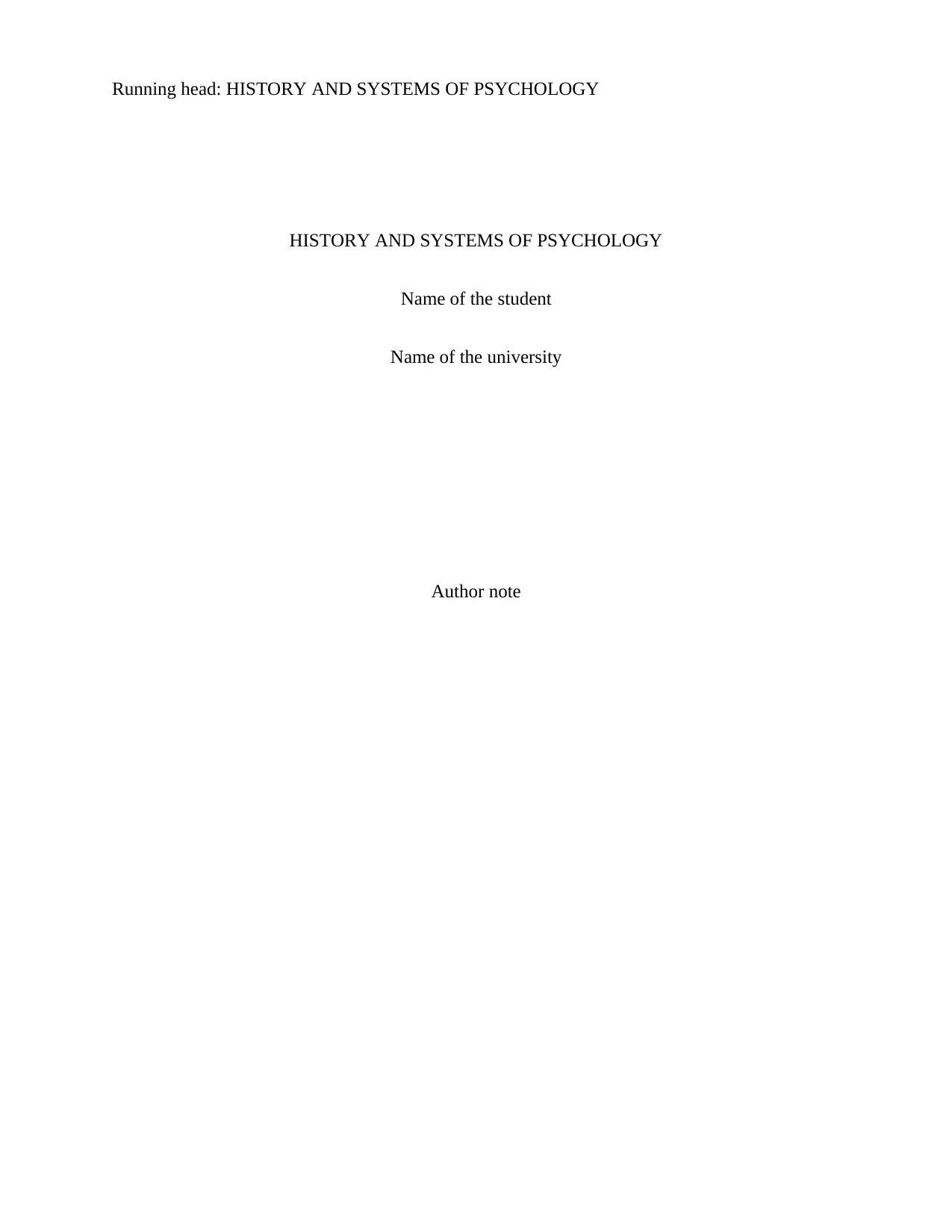
Running head: HISTORY AND SYSTEMS OF PSYCHOLOGY
HISTORY AND SYSTEMS OF PSYCHOLOGY
Name of the student
Name of the university
Author note
HISTORY AND SYSTEMS OF PSYCHOLOGY
Name of the student
Name of the university
Author note
Paraphrase This Document
Need a fresh take? Get an instant paraphrase of this document with our AI Paraphraser
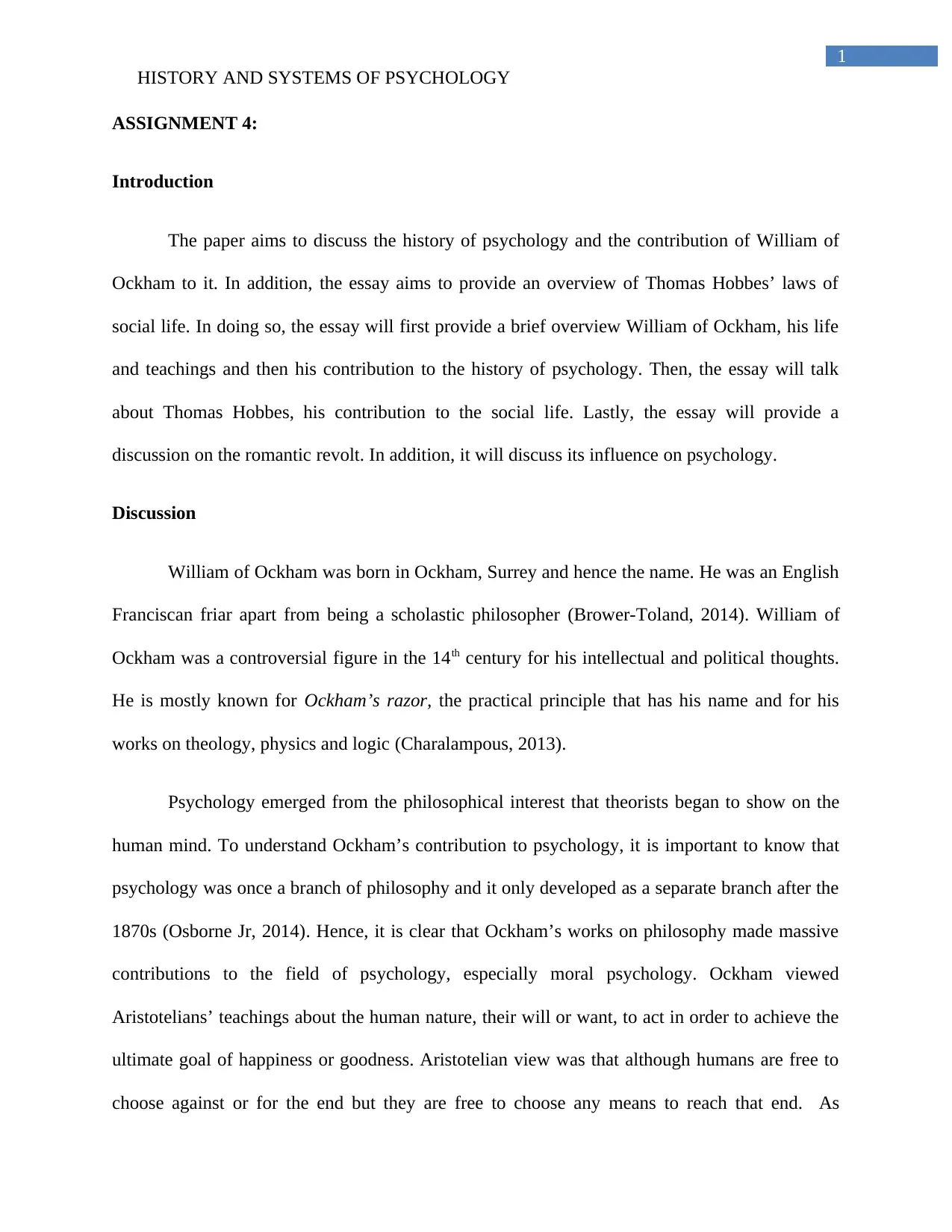
1
HISTORY AND SYSTEMS OF PSYCHOLOGY
ASSIGNMENT 4:
Introduction
The paper aims to discuss the history of psychology and the contribution of William of
Ockham to it. In addition, the essay aims to provide an overview of Thomas Hobbes’ laws of
social life. In doing so, the essay will first provide a brief overview William of Ockham, his life
and teachings and then his contribution to the history of psychology. Then, the essay will talk
about Thomas Hobbes, his contribution to the social life. Lastly, the essay will provide a
discussion on the romantic revolt. In addition, it will discuss its influence on psychology.
Discussion
William of Ockham was born in Ockham, Surrey and hence the name. He was an English
Franciscan friar apart from being a scholastic philosopher (Brower-Toland, 2014). William of
Ockham was a controversial figure in the 14th century for his intellectual and political thoughts.
He is mostly known for Ockham’s razor, the practical principle that has his name and for his
works on theology, physics and logic (Charalampous, 2013).
Psychology emerged from the philosophical interest that theorists began to show on the
human mind. To understand Ockham’s contribution to psychology, it is important to know that
psychology was once a branch of philosophy and it only developed as a separate branch after the
1870s (Osborne Jr, 2014). Hence, it is clear that Ockham’s works on philosophy made massive
contributions to the field of psychology, especially moral psychology. Ockham viewed
Aristotelians’ teachings about the human nature, their will or want, to act in order to achieve the
ultimate goal of happiness or goodness. Aristotelian view was that although humans are free to
choose against or for the end but they are free to choose any means to reach that end. As
HISTORY AND SYSTEMS OF PSYCHOLOGY
ASSIGNMENT 4:
Introduction
The paper aims to discuss the history of psychology and the contribution of William of
Ockham to it. In addition, the essay aims to provide an overview of Thomas Hobbes’ laws of
social life. In doing so, the essay will first provide a brief overview William of Ockham, his life
and teachings and then his contribution to the history of psychology. Then, the essay will talk
about Thomas Hobbes, his contribution to the social life. Lastly, the essay will provide a
discussion on the romantic revolt. In addition, it will discuss its influence on psychology.
Discussion
William of Ockham was born in Ockham, Surrey and hence the name. He was an English
Franciscan friar apart from being a scholastic philosopher (Brower-Toland, 2014). William of
Ockham was a controversial figure in the 14th century for his intellectual and political thoughts.
He is mostly known for Ockham’s razor, the practical principle that has his name and for his
works on theology, physics and logic (Charalampous, 2013).
Psychology emerged from the philosophical interest that theorists began to show on the
human mind. To understand Ockham’s contribution to psychology, it is important to know that
psychology was once a branch of philosophy and it only developed as a separate branch after the
1870s (Osborne Jr, 2014). Hence, it is clear that Ockham’s works on philosophy made massive
contributions to the field of psychology, especially moral psychology. Ockham viewed
Aristotelians’ teachings about the human nature, their will or want, to act in order to achieve the
ultimate goal of happiness or goodness. Aristotelian view was that although humans are free to
choose against or for the end but they are free to choose any means to reach that end. As
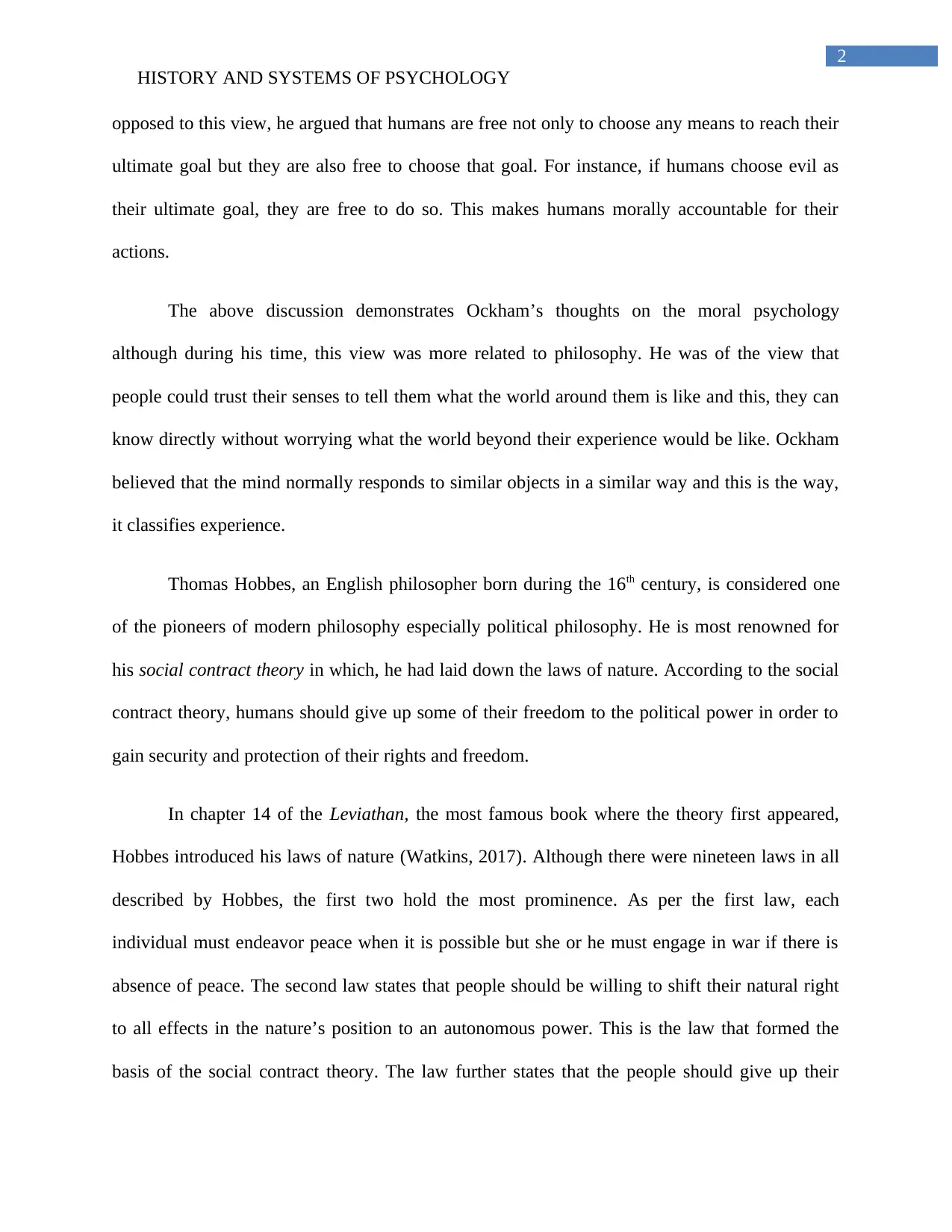
2
HISTORY AND SYSTEMS OF PSYCHOLOGY
opposed to this view, he argued that humans are free not only to choose any means to reach their
ultimate goal but they are also free to choose that goal. For instance, if humans choose evil as
their ultimate goal, they are free to do so. This makes humans morally accountable for their
actions.
The above discussion demonstrates Ockham’s thoughts on the moral psychology
although during his time, this view was more related to philosophy. He was of the view that
people could trust their senses to tell them what the world around them is like and this, they can
know directly without worrying what the world beyond their experience would be like. Ockham
believed that the mind normally responds to similar objects in a similar way and this is the way,
it classifies experience.
Thomas Hobbes, an English philosopher born during the 16th century, is considered one
of the pioneers of modern philosophy especially political philosophy. He is most renowned for
his social contract theory in which, he had laid down the laws of nature. According to the social
contract theory, humans should give up some of their freedom to the political power in order to
gain security and protection of their rights and freedom.
In chapter 14 of the Leviathan, the most famous book where the theory first appeared,
Hobbes introduced his laws of nature (Watkins, 2017). Although there were nineteen laws in all
described by Hobbes, the first two hold the most prominence. As per the first law, each
individual must endeavor peace when it is possible but she or he must engage in war if there is
absence of peace. The second law states that people should be willing to shift their natural right
to all effects in the nature’s position to an autonomous power. This is the law that formed the
basis of the social contract theory. The law further states that the people should give up their
HISTORY AND SYSTEMS OF PSYCHOLOGY
opposed to this view, he argued that humans are free not only to choose any means to reach their
ultimate goal but they are also free to choose that goal. For instance, if humans choose evil as
their ultimate goal, they are free to do so. This makes humans morally accountable for their
actions.
The above discussion demonstrates Ockham’s thoughts on the moral psychology
although during his time, this view was more related to philosophy. He was of the view that
people could trust their senses to tell them what the world around them is like and this, they can
know directly without worrying what the world beyond their experience would be like. Ockham
believed that the mind normally responds to similar objects in a similar way and this is the way,
it classifies experience.
Thomas Hobbes, an English philosopher born during the 16th century, is considered one
of the pioneers of modern philosophy especially political philosophy. He is most renowned for
his social contract theory in which, he had laid down the laws of nature. According to the social
contract theory, humans should give up some of their freedom to the political power in order to
gain security and protection of their rights and freedom.
In chapter 14 of the Leviathan, the most famous book where the theory first appeared,
Hobbes introduced his laws of nature (Watkins, 2017). Although there were nineteen laws in all
described by Hobbes, the first two hold the most prominence. As per the first law, each
individual must endeavor peace when it is possible but she or he must engage in war if there is
absence of peace. The second law states that people should be willing to shift their natural right
to all effects in the nature’s position to an autonomous power. This is the law that formed the
basis of the social contract theory. The law further states that the people should give up their
⊘ This is a preview!⊘
Do you want full access?
Subscribe today to unlock all pages.

Trusted by 1+ million students worldwide
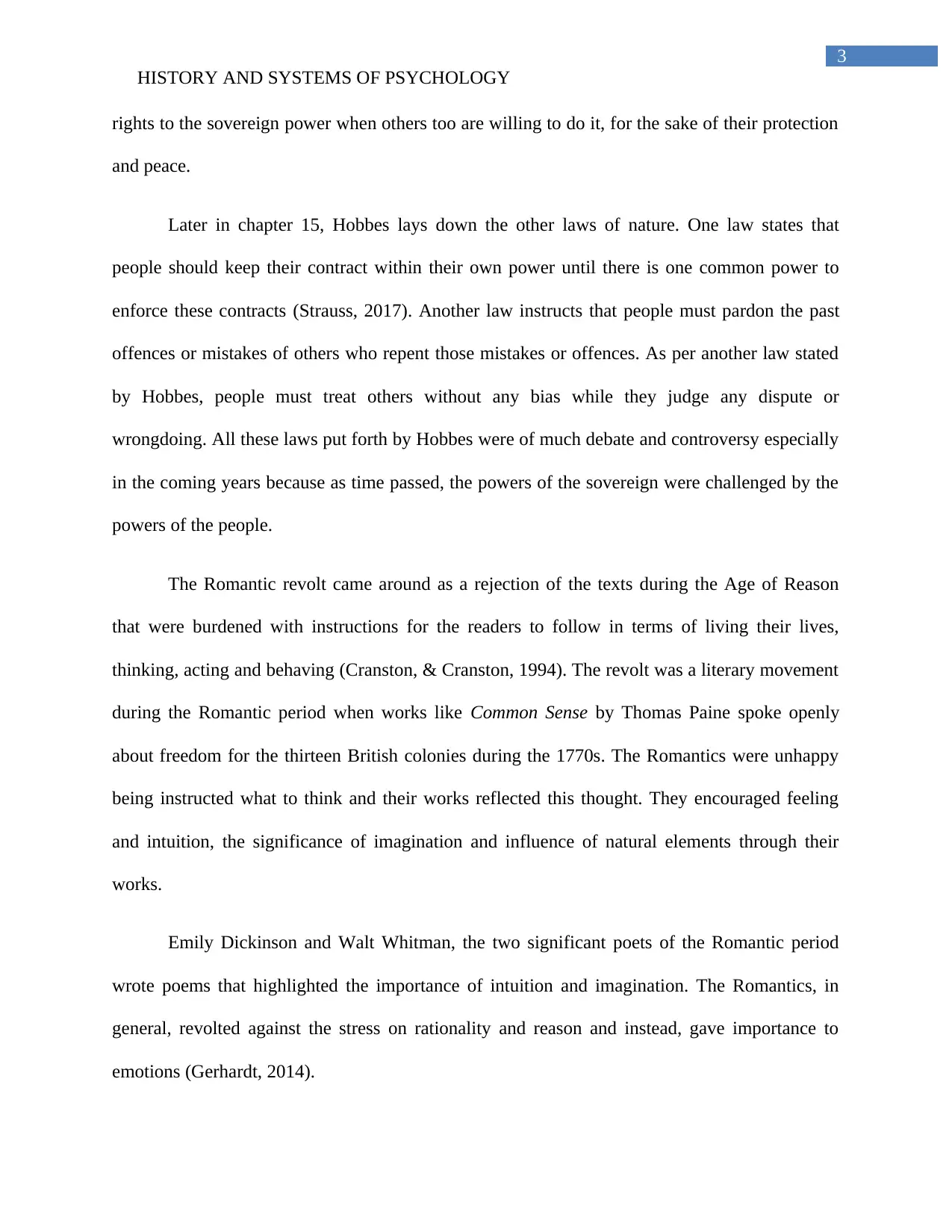
3
HISTORY AND SYSTEMS OF PSYCHOLOGY
rights to the sovereign power when others too are willing to do it, for the sake of their protection
and peace.
Later in chapter 15, Hobbes lays down the other laws of nature. One law states that
people should keep their contract within their own power until there is one common power to
enforce these contracts (Strauss, 2017). Another law instructs that people must pardon the past
offences or mistakes of others who repent those mistakes or offences. As per another law stated
by Hobbes, people must treat others without any bias while they judge any dispute or
wrongdoing. All these laws put forth by Hobbes were of much debate and controversy especially
in the coming years because as time passed, the powers of the sovereign were challenged by the
powers of the people.
The Romantic revolt came around as a rejection of the texts during the Age of Reason
that were burdened with instructions for the readers to follow in terms of living their lives,
thinking, acting and behaving (Cranston, & Cranston, 1994). The revolt was a literary movement
during the Romantic period when works like Common Sense by Thomas Paine spoke openly
about freedom for the thirteen British colonies during the 1770s. The Romantics were unhappy
being instructed what to think and their works reflected this thought. They encouraged feeling
and intuition, the significance of imagination and influence of natural elements through their
works.
Emily Dickinson and Walt Whitman, the two significant poets of the Romantic period
wrote poems that highlighted the importance of intuition and imagination. The Romantics, in
general, revolted against the stress on rationality and reason and instead, gave importance to
emotions (Gerhardt, 2014).
HISTORY AND SYSTEMS OF PSYCHOLOGY
rights to the sovereign power when others too are willing to do it, for the sake of their protection
and peace.
Later in chapter 15, Hobbes lays down the other laws of nature. One law states that
people should keep their contract within their own power until there is one common power to
enforce these contracts (Strauss, 2017). Another law instructs that people must pardon the past
offences or mistakes of others who repent those mistakes or offences. As per another law stated
by Hobbes, people must treat others without any bias while they judge any dispute or
wrongdoing. All these laws put forth by Hobbes were of much debate and controversy especially
in the coming years because as time passed, the powers of the sovereign were challenged by the
powers of the people.
The Romantic revolt came around as a rejection of the texts during the Age of Reason
that were burdened with instructions for the readers to follow in terms of living their lives,
thinking, acting and behaving (Cranston, & Cranston, 1994). The revolt was a literary movement
during the Romantic period when works like Common Sense by Thomas Paine spoke openly
about freedom for the thirteen British colonies during the 1770s. The Romantics were unhappy
being instructed what to think and their works reflected this thought. They encouraged feeling
and intuition, the significance of imagination and influence of natural elements through their
works.
Emily Dickinson and Walt Whitman, the two significant poets of the Romantic period
wrote poems that highlighted the importance of intuition and imagination. The Romantics, in
general, revolted against the stress on rationality and reason and instead, gave importance to
emotions (Gerhardt, 2014).
Paraphrase This Document
Need a fresh take? Get an instant paraphrase of this document with our AI Paraphraser
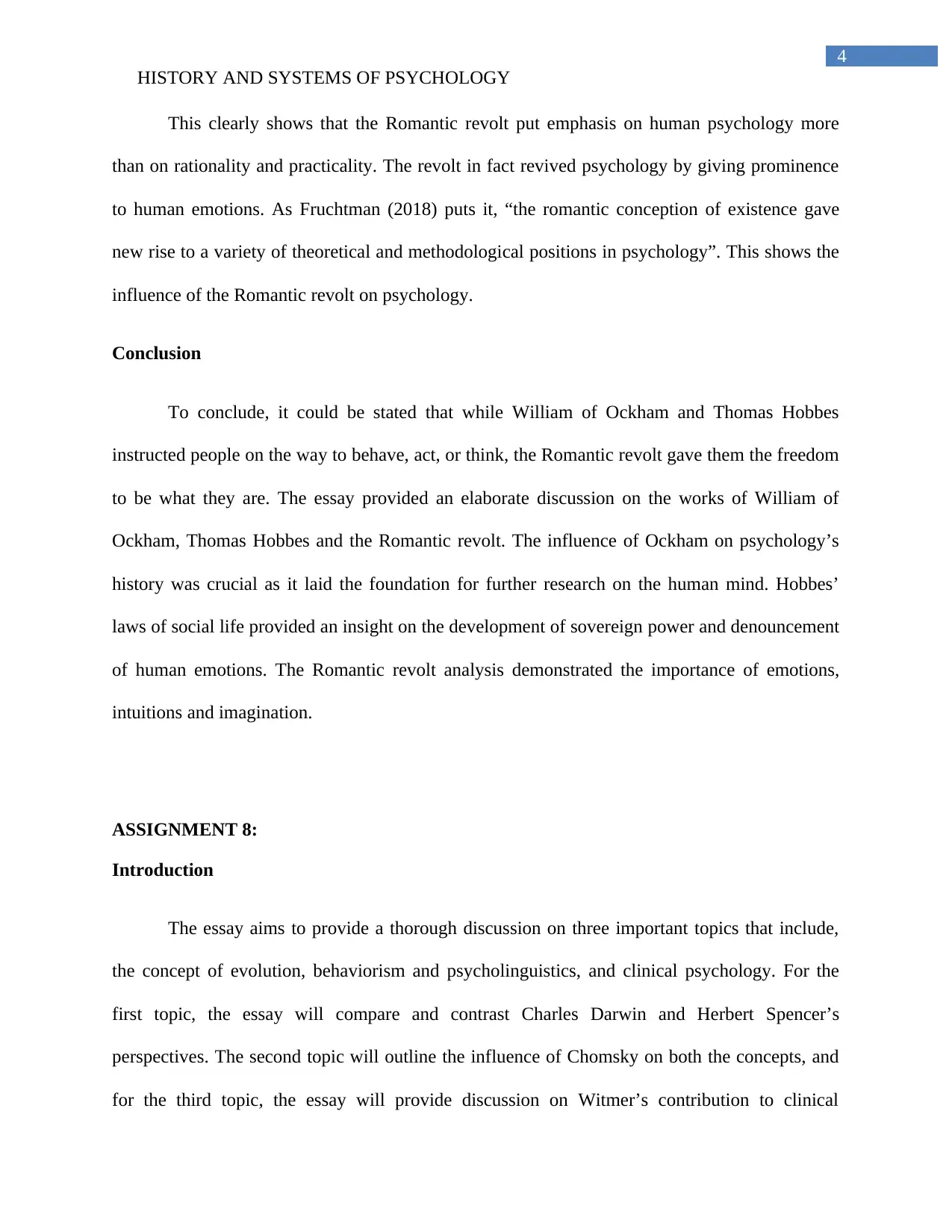
4
HISTORY AND SYSTEMS OF PSYCHOLOGY
This clearly shows that the Romantic revolt put emphasis on human psychology more
than on rationality and practicality. The revolt in fact revived psychology by giving prominence
to human emotions. As Fruchtman (2018) puts it, “the romantic conception of existence gave
new rise to a variety of theoretical and methodological positions in psychology”. This shows the
influence of the Romantic revolt on psychology.
Conclusion
To conclude, it could be stated that while William of Ockham and Thomas Hobbes
instructed people on the way to behave, act, or think, the Romantic revolt gave them the freedom
to be what they are. The essay provided an elaborate discussion on the works of William of
Ockham, Thomas Hobbes and the Romantic revolt. The influence of Ockham on psychology’s
history was crucial as it laid the foundation for further research on the human mind. Hobbes’
laws of social life provided an insight on the development of sovereign power and denouncement
of human emotions. The Romantic revolt analysis demonstrated the importance of emotions,
intuitions and imagination.
ASSIGNMENT 8:
Introduction
The essay aims to provide a thorough discussion on three important topics that include,
the concept of evolution, behaviorism and psycholinguistics, and clinical psychology. For the
first topic, the essay will compare and contrast Charles Darwin and Herbert Spencer’s
perspectives. The second topic will outline the influence of Chomsky on both the concepts, and
for the third topic, the essay will provide discussion on Witmer’s contribution to clinical
HISTORY AND SYSTEMS OF PSYCHOLOGY
This clearly shows that the Romantic revolt put emphasis on human psychology more
than on rationality and practicality. The revolt in fact revived psychology by giving prominence
to human emotions. As Fruchtman (2018) puts it, “the romantic conception of existence gave
new rise to a variety of theoretical and methodological positions in psychology”. This shows the
influence of the Romantic revolt on psychology.
Conclusion
To conclude, it could be stated that while William of Ockham and Thomas Hobbes
instructed people on the way to behave, act, or think, the Romantic revolt gave them the freedom
to be what they are. The essay provided an elaborate discussion on the works of William of
Ockham, Thomas Hobbes and the Romantic revolt. The influence of Ockham on psychology’s
history was crucial as it laid the foundation for further research on the human mind. Hobbes’
laws of social life provided an insight on the development of sovereign power and denouncement
of human emotions. The Romantic revolt analysis demonstrated the importance of emotions,
intuitions and imagination.
ASSIGNMENT 8:
Introduction
The essay aims to provide a thorough discussion on three important topics that include,
the concept of evolution, behaviorism and psycholinguistics, and clinical psychology. For the
first topic, the essay will compare and contrast Charles Darwin and Herbert Spencer’s
perspectives. The second topic will outline the influence of Chomsky on both the concepts, and
for the third topic, the essay will provide discussion on Witmer’s contribution to clinical
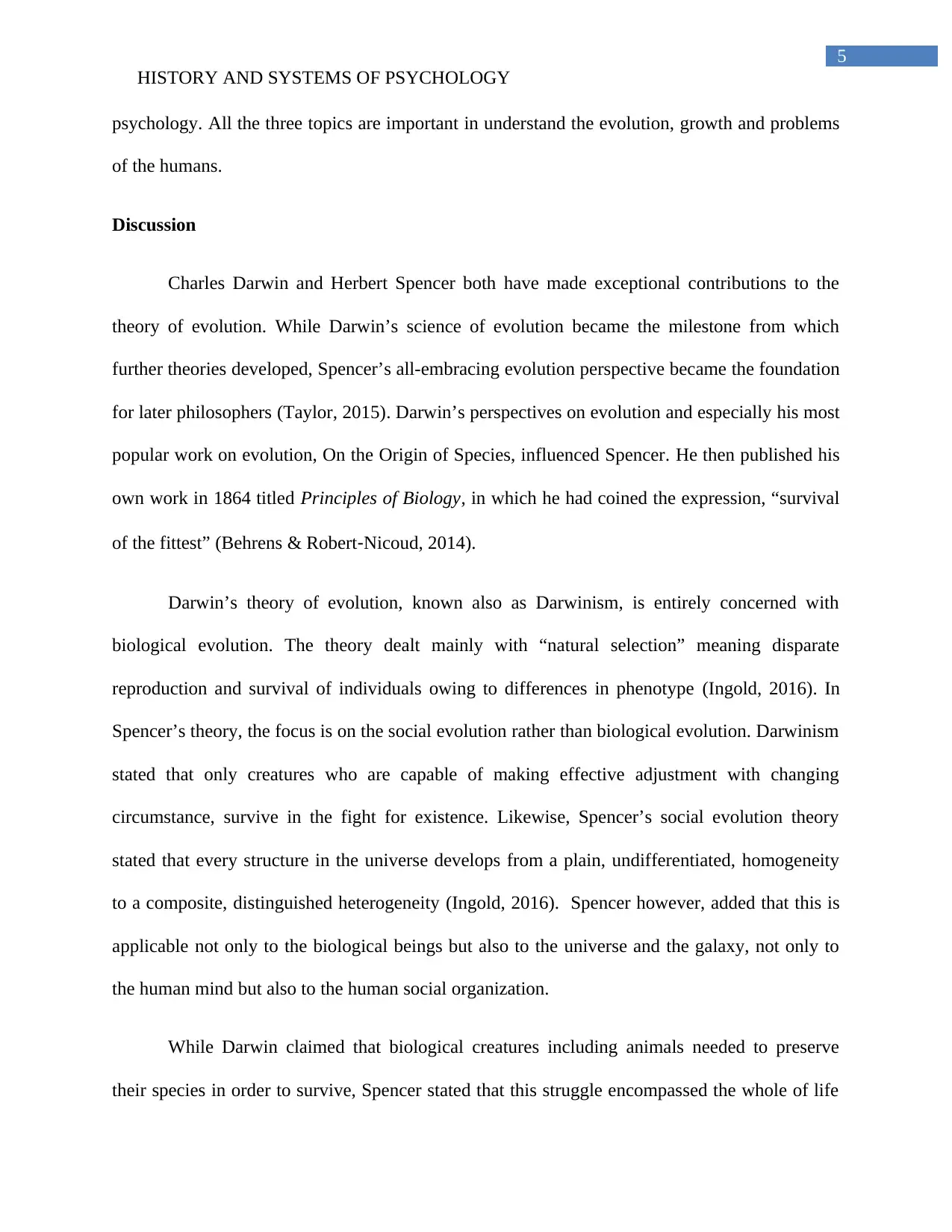
5
HISTORY AND SYSTEMS OF PSYCHOLOGY
psychology. All the three topics are important in understand the evolution, growth and problems
of the humans.
Discussion
Charles Darwin and Herbert Spencer both have made exceptional contributions to the
theory of evolution. While Darwin’s science of evolution became the milestone from which
further theories developed, Spencer’s all-embracing evolution perspective became the foundation
for later philosophers (Taylor, 2015). Darwin’s perspectives on evolution and especially his most
popular work on evolution, On the Origin of Species, influenced Spencer. He then published his
own work in 1864 titled Principles of Biology, in which he had coined the expression, “survival
of the fittest” (Behrens & Robert‐Nicoud, 2014).
Darwin’s theory of evolution, known also as Darwinism, is entirely concerned with
biological evolution. The theory dealt mainly with “natural selection” meaning disparate
reproduction and survival of individuals owing to differences in phenotype (Ingold, 2016). In
Spencer’s theory, the focus is on the social evolution rather than biological evolution. Darwinism
stated that only creatures who are capable of making effective adjustment with changing
circumstance, survive in the fight for existence. Likewise, Spencer’s social evolution theory
stated that every structure in the universe develops from a plain, undifferentiated, homogeneity
to a composite, distinguished heterogeneity (Ingold, 2016). Spencer however, added that this is
applicable not only to the biological beings but also to the universe and the galaxy, not only to
the human mind but also to the human social organization.
While Darwin claimed that biological creatures including animals needed to preserve
their species in order to survive, Spencer stated that this struggle encompassed the whole of life
HISTORY AND SYSTEMS OF PSYCHOLOGY
psychology. All the three topics are important in understand the evolution, growth and problems
of the humans.
Discussion
Charles Darwin and Herbert Spencer both have made exceptional contributions to the
theory of evolution. While Darwin’s science of evolution became the milestone from which
further theories developed, Spencer’s all-embracing evolution perspective became the foundation
for later philosophers (Taylor, 2015). Darwin’s perspectives on evolution and especially his most
popular work on evolution, On the Origin of Species, influenced Spencer. He then published his
own work in 1864 titled Principles of Biology, in which he had coined the expression, “survival
of the fittest” (Behrens & Robert‐Nicoud, 2014).
Darwin’s theory of evolution, known also as Darwinism, is entirely concerned with
biological evolution. The theory dealt mainly with “natural selection” meaning disparate
reproduction and survival of individuals owing to differences in phenotype (Ingold, 2016). In
Spencer’s theory, the focus is on the social evolution rather than biological evolution. Darwinism
stated that only creatures who are capable of making effective adjustment with changing
circumstance, survive in the fight for existence. Likewise, Spencer’s social evolution theory
stated that every structure in the universe develops from a plain, undifferentiated, homogeneity
to a composite, distinguished heterogeneity (Ingold, 2016). Spencer however, added that this is
applicable not only to the biological beings but also to the universe and the galaxy, not only to
the human mind but also to the human social organization.
While Darwin claimed that biological creatures including animals needed to preserve
their species in order to survive, Spencer stated that this struggle encompassed the whole of life
⊘ This is a preview!⊘
Do you want full access?
Subscribe today to unlock all pages.

Trusted by 1+ million students worldwide
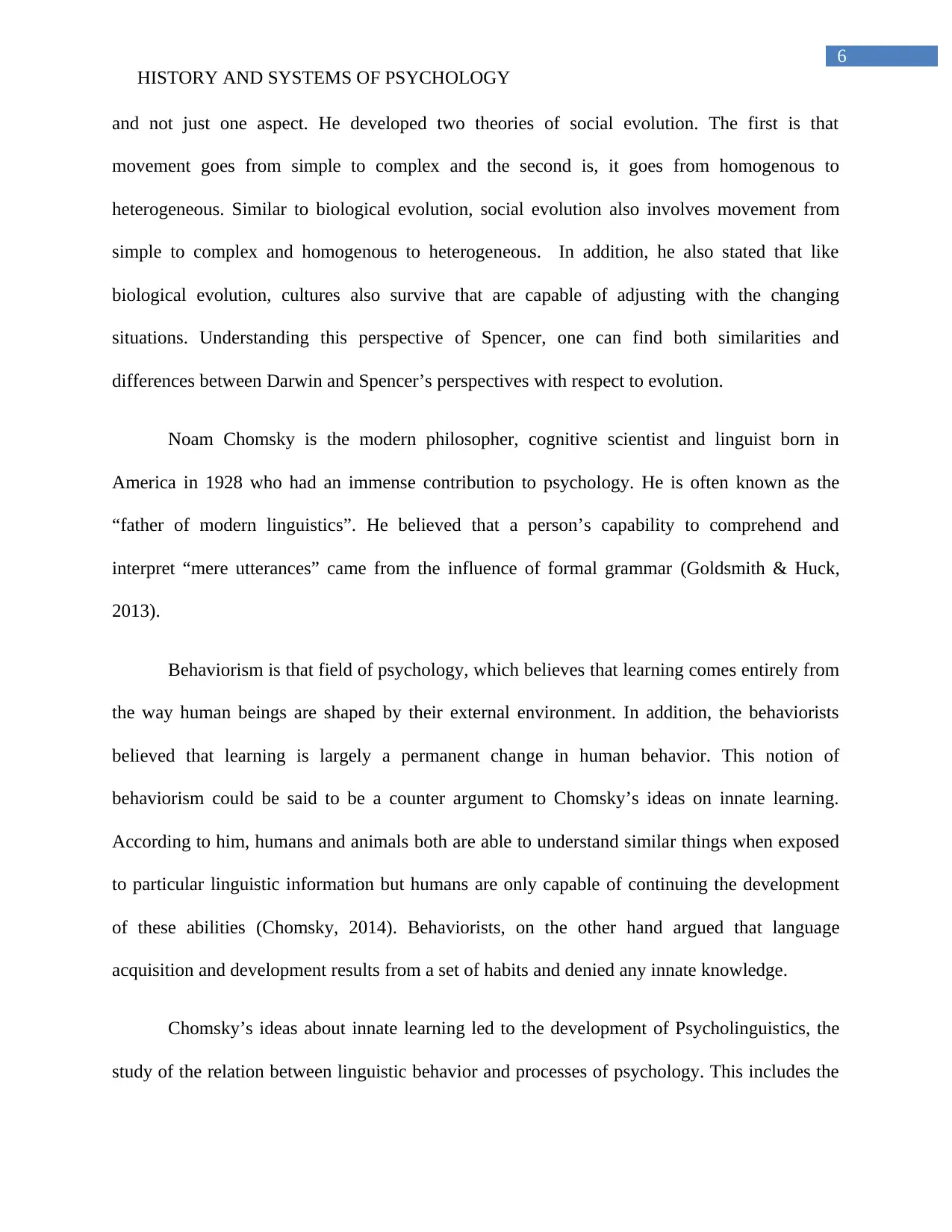
6
HISTORY AND SYSTEMS OF PSYCHOLOGY
and not just one aspect. He developed two theories of social evolution. The first is that
movement goes from simple to complex and the second is, it goes from homogenous to
heterogeneous. Similar to biological evolution, social evolution also involves movement from
simple to complex and homogenous to heterogeneous. In addition, he also stated that like
biological evolution, cultures also survive that are capable of adjusting with the changing
situations. Understanding this perspective of Spencer, one can find both similarities and
differences between Darwin and Spencer’s perspectives with respect to evolution.
Noam Chomsky is the modern philosopher, cognitive scientist and linguist born in
America in 1928 who had an immense contribution to psychology. He is often known as the
“father of modern linguistics”. He believed that a person’s capability to comprehend and
interpret “mere utterances” came from the influence of formal grammar (Goldsmith & Huck,
2013).
Behaviorism is that field of psychology, which believes that learning comes entirely from
the way human beings are shaped by their external environment. In addition, the behaviorists
believed that learning is largely a permanent change in human behavior. This notion of
behaviorism could be said to be a counter argument to Chomsky’s ideas on innate learning.
According to him, humans and animals both are able to understand similar things when exposed
to particular linguistic information but humans are only capable of continuing the development
of these abilities (Chomsky, 2014). Behaviorists, on the other hand argued that language
acquisition and development results from a set of habits and denied any innate knowledge.
Chomsky’s ideas about innate learning led to the development of Psycholinguistics, the
study of the relation between linguistic behavior and processes of psychology. This includes the
HISTORY AND SYSTEMS OF PSYCHOLOGY
and not just one aspect. He developed two theories of social evolution. The first is that
movement goes from simple to complex and the second is, it goes from homogenous to
heterogeneous. Similar to biological evolution, social evolution also involves movement from
simple to complex and homogenous to heterogeneous. In addition, he also stated that like
biological evolution, cultures also survive that are capable of adjusting with the changing
situations. Understanding this perspective of Spencer, one can find both similarities and
differences between Darwin and Spencer’s perspectives with respect to evolution.
Noam Chomsky is the modern philosopher, cognitive scientist and linguist born in
America in 1928 who had an immense contribution to psychology. He is often known as the
“father of modern linguistics”. He believed that a person’s capability to comprehend and
interpret “mere utterances” came from the influence of formal grammar (Goldsmith & Huck,
2013).
Behaviorism is that field of psychology, which believes that learning comes entirely from
the way human beings are shaped by their external environment. In addition, the behaviorists
believed that learning is largely a permanent change in human behavior. This notion of
behaviorism could be said to be a counter argument to Chomsky’s ideas on innate learning.
According to him, humans and animals both are able to understand similar things when exposed
to particular linguistic information but humans are only capable of continuing the development
of these abilities (Chomsky, 2014). Behaviorists, on the other hand argued that language
acquisition and development results from a set of habits and denied any innate knowledge.
Chomsky’s ideas about innate learning led to the development of Psycholinguistics, the
study of the relation between linguistic behavior and processes of psychology. This includes the
Paraphrase This Document
Need a fresh take? Get an instant paraphrase of this document with our AI Paraphraser
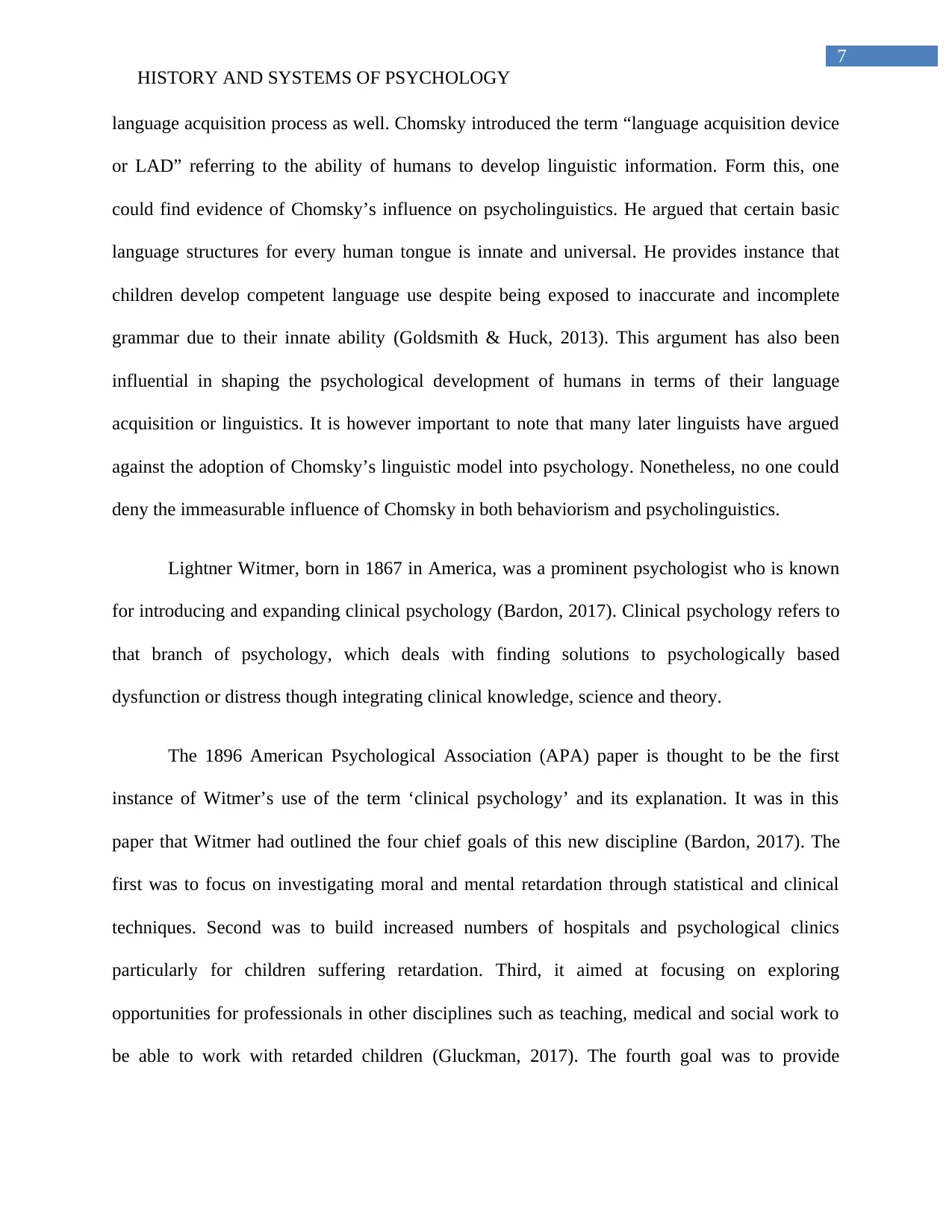
7
HISTORY AND SYSTEMS OF PSYCHOLOGY
language acquisition process as well. Chomsky introduced the term “language acquisition device
or LAD” referring to the ability of humans to develop linguistic information. Form this, one
could find evidence of Chomsky’s influence on psycholinguistics. He argued that certain basic
language structures for every human tongue is innate and universal. He provides instance that
children develop competent language use despite being exposed to inaccurate and incomplete
grammar due to their innate ability (Goldsmith & Huck, 2013). This argument has also been
influential in shaping the psychological development of humans in terms of their language
acquisition or linguistics. It is however important to note that many later linguists have argued
against the adoption of Chomsky’s linguistic model into psychology. Nonetheless, no one could
deny the immeasurable influence of Chomsky in both behaviorism and psycholinguistics.
Lightner Witmer, born in 1867 in America, was a prominent psychologist who is known
for introducing and expanding clinical psychology (Bardon, 2017). Clinical psychology refers to
that branch of psychology, which deals with finding solutions to psychologically based
dysfunction or distress though integrating clinical knowledge, science and theory.
The 1896 American Psychological Association (APA) paper is thought to be the first
instance of Witmer’s use of the term ‘clinical psychology’ and its explanation. It was in this
paper that Witmer had outlined the four chief goals of this new discipline (Bardon, 2017). The
first was to focus on investigating moral and mental retardation through statistical and clinical
techniques. Second was to build increased numbers of hospitals and psychological clinics
particularly for children suffering retardation. Third, it aimed at focusing on exploring
opportunities for professionals in other disciplines such as teaching, medical and social work to
be able to work with retarded children (Gluckman, 2017). The fourth goal was to provide
HISTORY AND SYSTEMS OF PSYCHOLOGY
language acquisition process as well. Chomsky introduced the term “language acquisition device
or LAD” referring to the ability of humans to develop linguistic information. Form this, one
could find evidence of Chomsky’s influence on psycholinguistics. He argued that certain basic
language structures for every human tongue is innate and universal. He provides instance that
children develop competent language use despite being exposed to inaccurate and incomplete
grammar due to their innate ability (Goldsmith & Huck, 2013). This argument has also been
influential in shaping the psychological development of humans in terms of their language
acquisition or linguistics. It is however important to note that many later linguists have argued
against the adoption of Chomsky’s linguistic model into psychology. Nonetheless, no one could
deny the immeasurable influence of Chomsky in both behaviorism and psycholinguistics.
Lightner Witmer, born in 1867 in America, was a prominent psychologist who is known
for introducing and expanding clinical psychology (Bardon, 2017). Clinical psychology refers to
that branch of psychology, which deals with finding solutions to psychologically based
dysfunction or distress though integrating clinical knowledge, science and theory.
The 1896 American Psychological Association (APA) paper is thought to be the first
instance of Witmer’s use of the term ‘clinical psychology’ and its explanation. It was in this
paper that Witmer had outlined the four chief goals of this new discipline (Bardon, 2017). The
first was to focus on investigating moral and mental retardation through statistical and clinical
techniques. Second was to build increased numbers of hospitals and psychological clinics
particularly for children suffering retardation. Third, it aimed at focusing on exploring
opportunities for professionals in other disciplines such as teaching, medical and social work to
be able to work with retarded children (Gluckman, 2017). The fourth goal was to provide
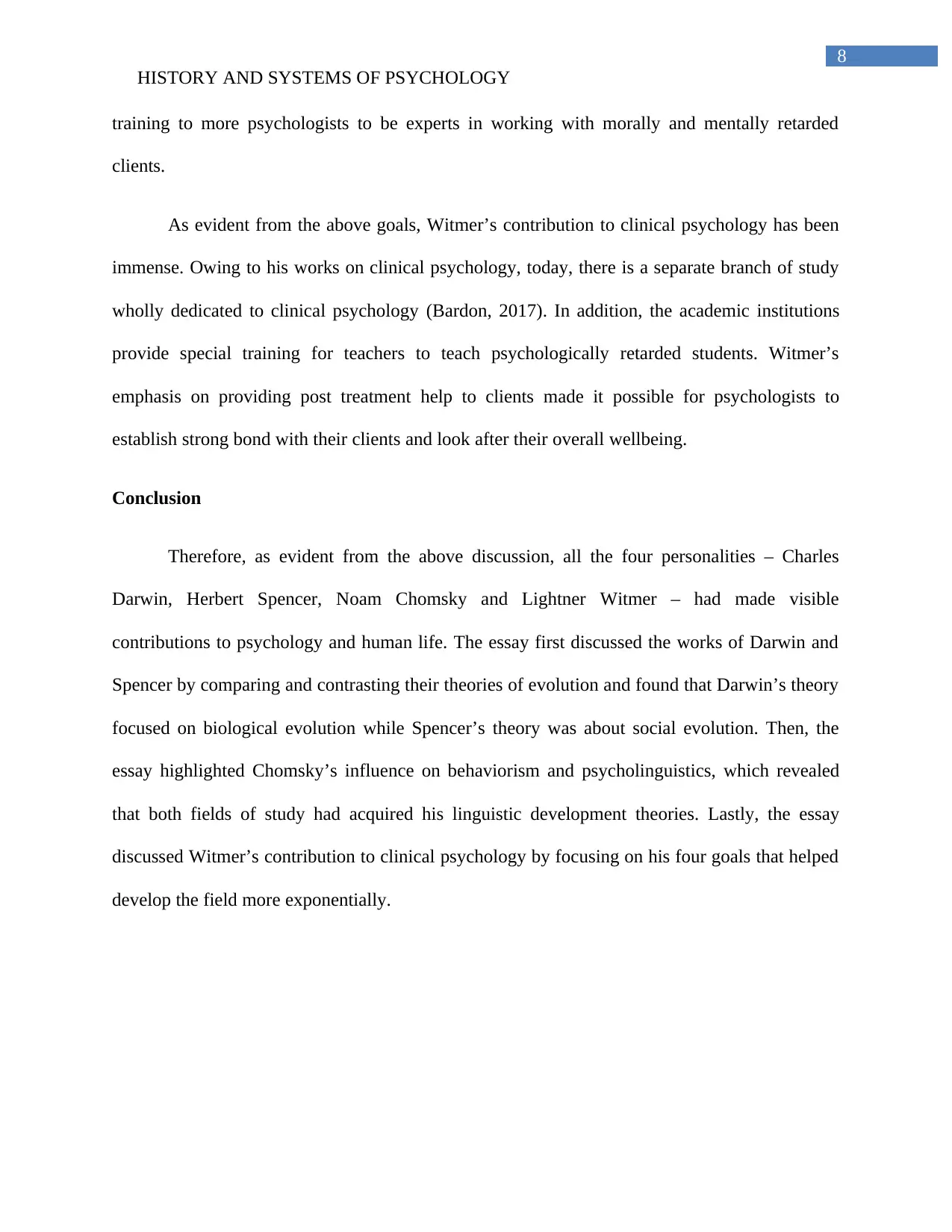
8
HISTORY AND SYSTEMS OF PSYCHOLOGY
training to more psychologists to be experts in working with morally and mentally retarded
clients.
As evident from the above goals, Witmer’s contribution to clinical psychology has been
immense. Owing to his works on clinical psychology, today, there is a separate branch of study
wholly dedicated to clinical psychology (Bardon, 2017). In addition, the academic institutions
provide special training for teachers to teach psychologically retarded students. Witmer’s
emphasis on providing post treatment help to clients made it possible for psychologists to
establish strong bond with their clients and look after their overall wellbeing.
Conclusion
Therefore, as evident from the above discussion, all the four personalities – Charles
Darwin, Herbert Spencer, Noam Chomsky and Lightner Witmer – had made visible
contributions to psychology and human life. The essay first discussed the works of Darwin and
Spencer by comparing and contrasting their theories of evolution and found that Darwin’s theory
focused on biological evolution while Spencer’s theory was about social evolution. Then, the
essay highlighted Chomsky’s influence on behaviorism and psycholinguistics, which revealed
that both fields of study had acquired his linguistic development theories. Lastly, the essay
discussed Witmer’s contribution to clinical psychology by focusing on his four goals that helped
develop the field more exponentially.
HISTORY AND SYSTEMS OF PSYCHOLOGY
training to more psychologists to be experts in working with morally and mentally retarded
clients.
As evident from the above goals, Witmer’s contribution to clinical psychology has been
immense. Owing to his works on clinical psychology, today, there is a separate branch of study
wholly dedicated to clinical psychology (Bardon, 2017). In addition, the academic institutions
provide special training for teachers to teach psychologically retarded students. Witmer’s
emphasis on providing post treatment help to clients made it possible for psychologists to
establish strong bond with their clients and look after their overall wellbeing.
Conclusion
Therefore, as evident from the above discussion, all the four personalities – Charles
Darwin, Herbert Spencer, Noam Chomsky and Lightner Witmer – had made visible
contributions to psychology and human life. The essay first discussed the works of Darwin and
Spencer by comparing and contrasting their theories of evolution and found that Darwin’s theory
focused on biological evolution while Spencer’s theory was about social evolution. Then, the
essay highlighted Chomsky’s influence on behaviorism and psycholinguistics, which revealed
that both fields of study had acquired his linguistic development theories. Lastly, the essay
discussed Witmer’s contribution to clinical psychology by focusing on his four goals that helped
develop the field more exponentially.
⊘ This is a preview!⊘
Do you want full access?
Subscribe today to unlock all pages.

Trusted by 1+ million students worldwide
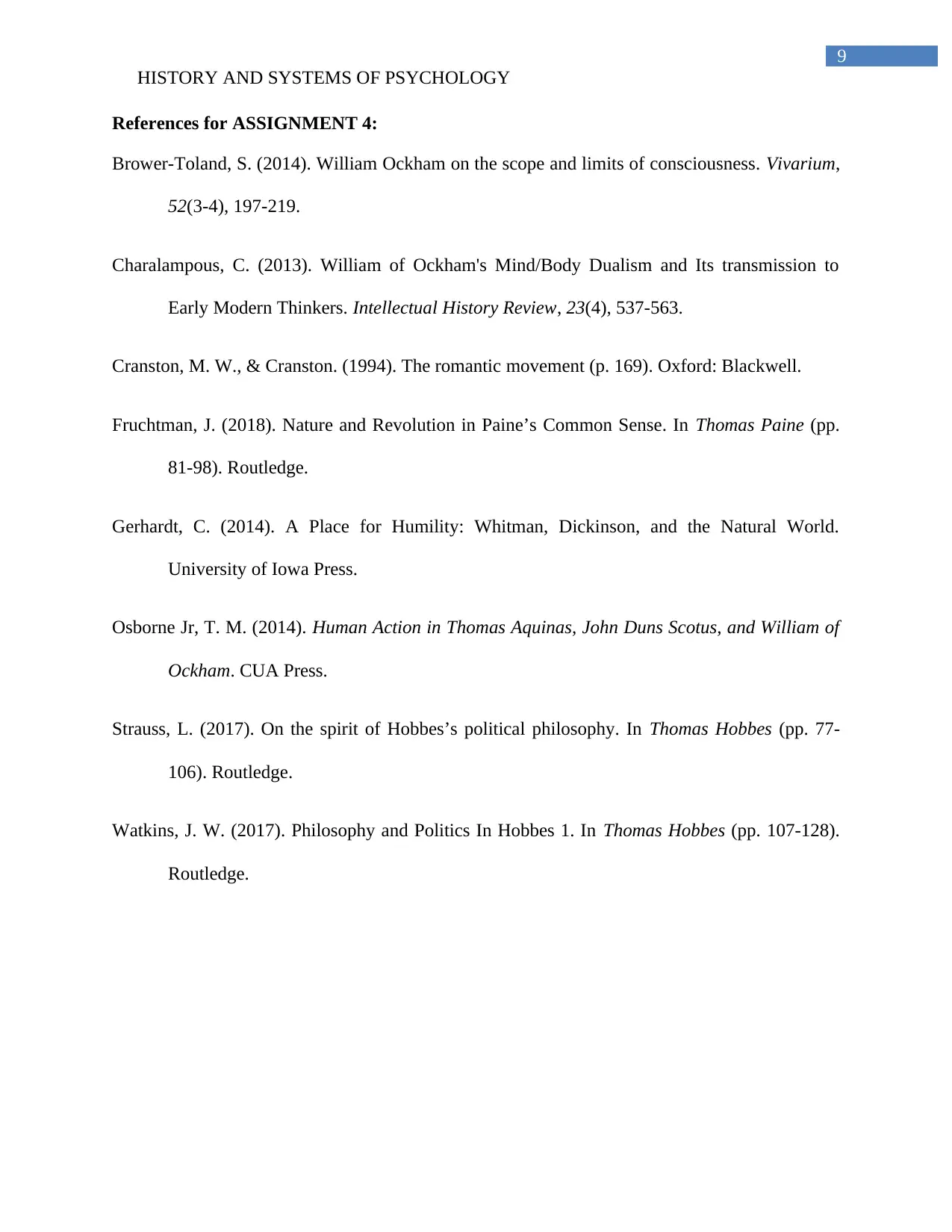
9
HISTORY AND SYSTEMS OF PSYCHOLOGY
References for ASSIGNMENT 4:
Brower-Toland, S. (2014). William Ockham on the scope and limits of consciousness. Vivarium,
52(3-4), 197-219.
Charalampous, C. (2013). William of Ockham's Mind/Body Dualism and Its transmission to
Early Modern Thinkers. Intellectual History Review, 23(4), 537-563.
Cranston, M. W., & Cranston. (1994). The romantic movement (p. 169). Oxford: Blackwell.
Fruchtman, J. (2018). Nature and Revolution in Paine’s Common Sense. In Thomas Paine (pp.
81-98). Routledge.
Gerhardt, C. (2014). A Place for Humility: Whitman, Dickinson, and the Natural World.
University of Iowa Press.
Osborne Jr, T. M. (2014). Human Action in Thomas Aquinas, John Duns Scotus, and William of
Ockham. CUA Press.
Strauss, L. (2017). On the spirit of Hobbes’s political philosophy. In Thomas Hobbes (pp. 77-
106). Routledge.
Watkins, J. W. (2017). Philosophy and Politics In Hobbes 1. In Thomas Hobbes (pp. 107-128).
Routledge.
HISTORY AND SYSTEMS OF PSYCHOLOGY
References for ASSIGNMENT 4:
Brower-Toland, S. (2014). William Ockham on the scope and limits of consciousness. Vivarium,
52(3-4), 197-219.
Charalampous, C. (2013). William of Ockham's Mind/Body Dualism and Its transmission to
Early Modern Thinkers. Intellectual History Review, 23(4), 537-563.
Cranston, M. W., & Cranston. (1994). The romantic movement (p. 169). Oxford: Blackwell.
Fruchtman, J. (2018). Nature and Revolution in Paine’s Common Sense. In Thomas Paine (pp.
81-98). Routledge.
Gerhardt, C. (2014). A Place for Humility: Whitman, Dickinson, and the Natural World.
University of Iowa Press.
Osborne Jr, T. M. (2014). Human Action in Thomas Aquinas, John Duns Scotus, and William of
Ockham. CUA Press.
Strauss, L. (2017). On the spirit of Hobbes’s political philosophy. In Thomas Hobbes (pp. 77-
106). Routledge.
Watkins, J. W. (2017). Philosophy and Politics In Hobbes 1. In Thomas Hobbes (pp. 107-128).
Routledge.
Paraphrase This Document
Need a fresh take? Get an instant paraphrase of this document with our AI Paraphraser
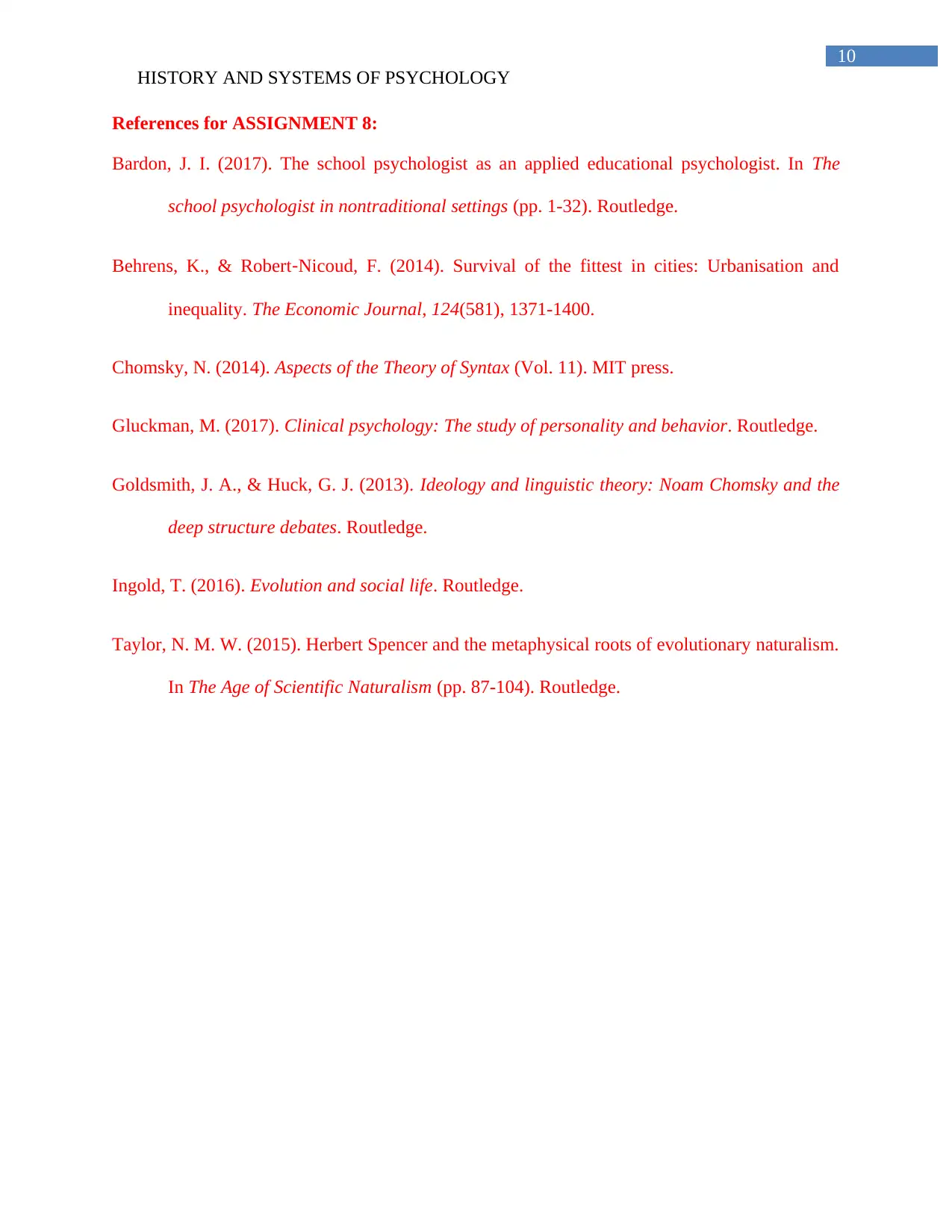
10
HISTORY AND SYSTEMS OF PSYCHOLOGY
References for ASSIGNMENT 8:
Bardon, J. I. (2017). The school psychologist as an applied educational psychologist. In The
school psychologist in nontraditional settings (pp. 1-32). Routledge.
Behrens, K., & Robert‐Nicoud, F. (2014). Survival of the fittest in cities: Urbanisation and
inequality. The Economic Journal, 124(581), 1371-1400.
Chomsky, N. (2014). Aspects of the Theory of Syntax (Vol. 11). MIT press.
Gluckman, M. (2017). Clinical psychology: The study of personality and behavior. Routledge.
Goldsmith, J. A., & Huck, G. J. (2013). Ideology and linguistic theory: Noam Chomsky and the
deep structure debates. Routledge.
Ingold, T. (2016). Evolution and social life. Routledge.
Taylor, N. M. W. (2015). Herbert Spencer and the metaphysical roots of evolutionary naturalism.
In The Age of Scientific Naturalism (pp. 87-104). Routledge.
HISTORY AND SYSTEMS OF PSYCHOLOGY
References for ASSIGNMENT 8:
Bardon, J. I. (2017). The school psychologist as an applied educational psychologist. In The
school psychologist in nontraditional settings (pp. 1-32). Routledge.
Behrens, K., & Robert‐Nicoud, F. (2014). Survival of the fittest in cities: Urbanisation and
inequality. The Economic Journal, 124(581), 1371-1400.
Chomsky, N. (2014). Aspects of the Theory of Syntax (Vol. 11). MIT press.
Gluckman, M. (2017). Clinical psychology: The study of personality and behavior. Routledge.
Goldsmith, J. A., & Huck, G. J. (2013). Ideology and linguistic theory: Noam Chomsky and the
deep structure debates. Routledge.
Ingold, T. (2016). Evolution and social life. Routledge.
Taylor, N. M. W. (2015). Herbert Spencer and the metaphysical roots of evolutionary naturalism.
In The Age of Scientific Naturalism (pp. 87-104). Routledge.
1 out of 11
Your All-in-One AI-Powered Toolkit for Academic Success.
+13062052269
info@desklib.com
Available 24*7 on WhatsApp / Email
![[object Object]](/_next/static/media/star-bottom.7253800d.svg)
Unlock your academic potential
Copyright © 2020–2026 A2Z Services. All Rights Reserved. Developed and managed by ZUCOL.

